GROWING CO!
Page 64
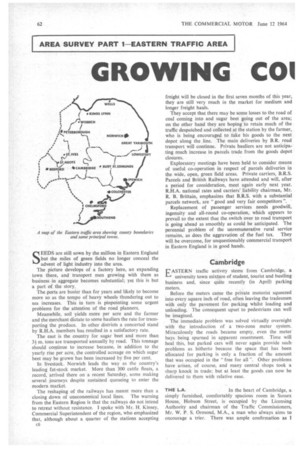
Page 65
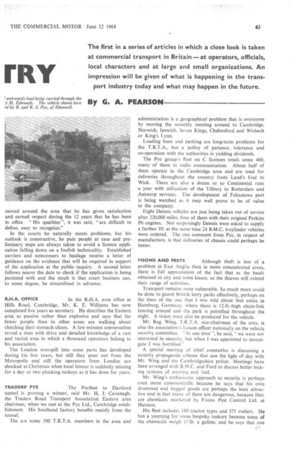
Page 66
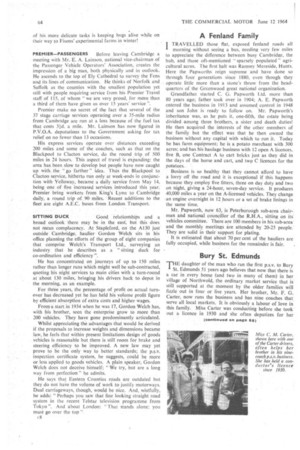
Page 70
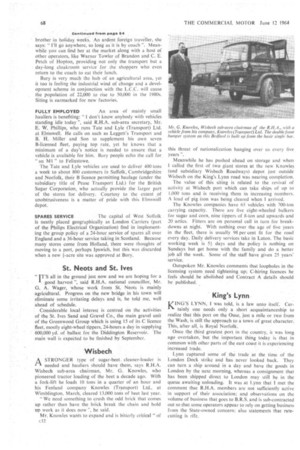
Page 71
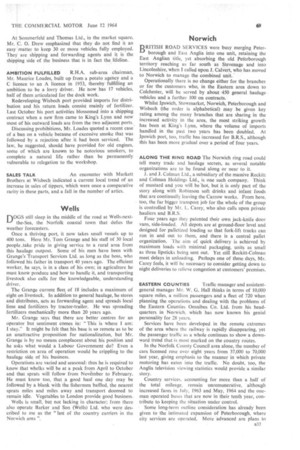
Page 72
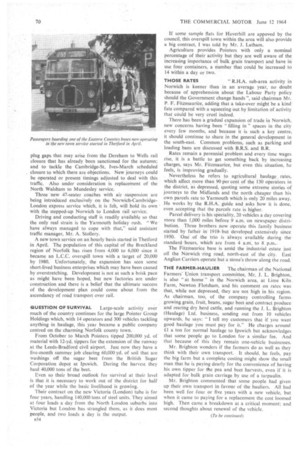
If you've noticed an error in this article please click here to report it so we can fix it.
rRY
By G. A. PEARSON
SEEDS are still sown by the million in Eastern England but the miles of green fields no longer conceal the advent of light industry into the area. The picture develops of a factory here, an expanding town there, and transport men growing with them as business in aggregate becomes substantial; yet this is but a part of the story.
The ports are busier than for years and likely to become more so as the tempo of heavy wheels thundering out to sea increases. This in turn is pinpointing some urgent problems for the attention of the road planners.
Meanwhile, soil yields more per acre and the farmer and the merchant dictate to some hauliers the rate for transporting the produce. In other districts a concerted stand by R.H.A. members has resulted in a satisfactory rate.
The east is the country for sugar beet and more than 3-1m. tons are transported annually by road. This tonnage should continue to increase because, in addition to the yearly rise per acre, the controlled acreage on which sugar beet may be grown has been increased by five per cent.
In livestock, Norwich leads the way as the country's leading fat-stock market. More than 300 cattle floats, a record, arrived there on a recent Saturday, some making several journeys despite sustained queueing to enter the modern market.
The reshaping of the railways has meant more than a closing down of uneconomical local lines. The warning from the Eastern Region is that the railways do not intend to retreat without resistance. I spoke with Mr. H. Kinsey, Commercial Superintendent of the region, who emphasized that, although about a quarter of the stations accepting c6 freight will be closed in the first seven months of this year, they are still very much in the market for medium and longer freight hauls.
They accept that there may be some losses to the road of coal coming into and sugar beet going out of the area; on the other hand they are hoping to retain much of the traffic despatched and collected at the station by the farmer, who is being encouraged to take his goods to the next depot along the line. The main deliveries by B.R. road transport will continue. Private hauliers are not anticipating much increase in parcels trade from the goods depot closures.
Exploratory meetings have been held to consider means of useful co-operation in respect of parcels deliveries in the wide, open, green field areas. Private carriers, B.R.S. Parcels and British Railways have attended and will, after a period for consideration, meet again early next year. R.H.A. national rates and carriers' liability chairman, Mr. R. B. Brittain, emphasizes that B.R.S. with a substantial parcels network, are "good and very fair competitors ". '
Replacement of passenger services needs goodwill, ingenuity and all-round co-operation, which appears to prevail to the extent that the switch over to road transport is going ahead as smoothly as could be anticipated. The perennial problem of the unremunerative rural service remains, as does the aggravation of the fuel tax. They will be overcome, for unquestionably commercial transport in Eastern England is in good hands.
Cambridge
EASTERN traffic activity stems from Cambridge, a J-4 university town mixture of student, tourist and bustling business and, since quite recently (in April) parking meters.
Before the meters came the private motorist squeezed into every square inch of road, often leaving the tradesmen with only the pavement for parking whilst loading and unloading. The consequent upset to pedestrians can well be imagined.
The immediate problem was solved virtually overnight with the introduction of a two-zone meter system. Miraculously the roads became empty, even the meter bays being spurned in apparent resentment. Time will heal this, but parked cars will never again provide such problems as hitherto because the space that has been allocated for parking is only a fraction of the amount that was occupied in the "free for all ". Other problems have arisen, of course, and many central shops took a sharp knock in trade: but at least the goods can now be delivered to them with relative ease.
THE L.A. In the heart of Cambridge, a
simply furnished, comfortably spacious room in Sussex House, Hobson Street, is occupied by the Licensing Authority and chairman of the Traffic Commissioners, Mr. W. P. S. Ormond, M.A., a man who always aims to encourage a trier. There was ample confirmation as moved around the area that he has given satisfaction and earned respect during the 12 years that he has been in office. "His qualities ", it was said, "are difficult to define, easy to recognize."
In the courts he naturally meets problems, but his outlook is constructive, he puts people at ease and preliminary steps are always taken to avoid a licence application falling down on a foolish technicality. Established carriers and newcomers to haulage receive a letter of guidance on the evidence that will be required in support of the application at the public inquiry. A second letter follows nearer the date to check if the application is being persisted with and the result is that court business can, to some degree, be streamlined in advance.
R.H.A. OFFICE in the R.H.A. area office at
Hills Road, Cambridge, Mr. K. E. Williams has now completed five years as secretary. He describes the Eastern area as passive rather than explosive and says that far fewer people than in other areas are walking about clutching their stomach ulcers. A feW minutes conversation reveal a man with drive and detailed knowledge of a vast and varied area in which a thousand operators belong to his association.
The London overspill into some parts has developed during his five years, but still they pour out from the Metropolis and still the operators from London are shocked at Christmas when local labour is suddenly missing for a day or two plucking turkeys as it has done for years.
TRADERS PYE The Purffeet to Dartford
tunnel is proving a winner, said Mr. H. J. Cavanagh, the Traders Road Transport Association Eastern area chairman, when we met at the Pye Ltd., Cambridge establishment. His Southend factory benefits mainly from the tunnel.
The are some 500 T.R.T.A. members in the area and administration is a geographical problem that is overcome by moving the monthly meeting around to Cambridge, Norwich, Ipswich, Seven Kings, Chelmsford and Wisbech or King's Lynn.
Loading bans and parking are long-term problems for the T.R.T.A., but a policy of patience, tolerance and co-operation with the authorities is yielding dividends.
The Pye group's fleet on C licences totals some 400, many of them in radio communication. About half of them operate in the Cambridge area and are used for deliveries throughout the country from Land's End to Wick. There are also a dozen or so Continental runs a year with utilization of the Tilbury to Rotterdam and Antwerp services. The development of Felixstowe port is being watched as it may well prove to be of value to the company.
Eight Dennis vehicles are just being taken out of service after 320,000 miles, four of them with their original Perkins P6 engines. Not surprisingly Dennis were asked to supply a further 10; at the same time 24 B.M.C. 6-cylinder vehicles were ordered. The one comment from Pye, in respect of manufacture, is that deliveries of chassis could perhaps be better.
FISONS AND PESTS Although theft is less of a
problem in East Anglia than in more concentrated areas, there is full appreciation of the fact that as the hauls obtained in city and town lessen, so the thieves will extend their range of activities.
Transport remains most vulnerable. So much more could be done to guard British lorry parks effectively, perhaps On the lines of the one that I was told about that exists in Hamburg, Germany, where there is 12-ft.-high chain-link fencing around and the park is patrolled throughout the night. A ticket must also be produced for the vehicle.
Mr. Reg. Wing, T.R.T.A. vice-chairman of the area, is also the association's liaison officer nationally on the vehicle security committee. -At one time ", he said, " we were not interested in security, but when 1 was appointed to investigate I was horrified.
A special meeting of chief constables is discussing a security propaganda scheme that saw the light of day with Mr. Wing and the Cambridgeshire police. Meetings have been arranged with B.M.C. and Ford to discuss better locking systems of steering and fuel.
Mr. Wing's enthusiastic approach to security is perhaps even more commendable because he says that his own drummed and bagged goods are perhaps the least attractive and in fact many of them are dangerous, because they are chemicals marketed by Fisons Pest Control Ltd. at Harston.
His fleet includes 180 tractor types and 375 trailers. He has a yearning for some bespoke tankers because some of the chemicals weigh 171h. a gallon; and he says that one c7 of his more delicate tasks is keeping bugs alive while on their way to Fisons' experimental farms in winter!
PREMIER—PASSENGERS Before leaving Cambridge a meeting with Mr. E. A. Lainson, national vice-chairman of the Passenger Vehicle Operators' Association,. creates the impression of a big man, both physically and in outlook. He ascends to the top of Ely Cathedral to survey the Fens and its lines of communication. He thinks of Norfolk and Suffolk as the counties with the smallest population yet still with people requiring service from his Premier Travel staff of 115, of whom "we are very proud, for more than a third of them have given us over 15 years' service ".
Premier make no secret of the fact that several of the 37 stage carriage services operating over .a 35-mile radius from Cambridge are run at a loss because of the fuel tax that costs 344. a mile. Mr. Lainson has now figured in P.V.O.A. deputations to the Government asking for tax relief on no fewer than 13 occasions.
His express services operate over distances exceeding 200 miles and some of the coaches, such as that on the Blackpool to Clacton service, do the round .trip of 500 miles in 24 hours. This aspect of travel is expanding: the area has been slow to develop but people have now caught up with. the "go farther" idea. Thus the Blackpooltci Clacton service, hitherto run only. at Week-ends in conjunction with Yelloway, became a daily service from May 14, being one of five inereased services, introduced this year. Premier bring workers from King's Lynn to Cambridge daily, a round trip of 90 miles. 'Recent additions to the fleet are eight A.E.C. buses from LOndonTransport.
SITTING DUCK Good, relationships and a
broad outlook there may be in the east, but this does not mean complacency. At Stapleford, on the A130 just outside Cambridge, haulier Gordon Welch sits in his office planning the efforts of the group of eight companies that comprise Welch's Transport Ltd., surveying an industry that he describes as a "sitting duck for co-ordination and efficiency ".
He has concentrated on journeys of up to 150 miles rather than longer runs which might well be sub-contracted, quoting his night services to main cities with a turn-round at about 130 miles, bringing his drivers back to depot in the morning, as an example.
For three years, the percentage of profit on actual turnover has decreased yet he has held his volume profit figure by efficient absorption of extra costs and higher wages.
From a start in 1934 when he was 17, Gordon Welch has with his brother, seen the enterprise grow to more than 200 vehicles. They have gone predominantly articulated.
Whilst appreciating the advantages that would be derived if the proposals to increase weights and dimensions became Jaw, he feels that within present limitations design of goods vehicles is reasonable but there is still room for brake and steering .efficiency to be improved. A new law may yet prove to be the only way to better standards; the pm,. inspection certificate system, he suggests, could be more or less applied to goods vehicles. A plain speaker, Gordon Welch does not deceive himself; We try, but are a long
way from perfection" he admits. • He says that Eastern Counties roads are outdated but they do not have the volume of work to justify motorways. Dual carriageways, though, would be nice. And, wistfully, he adds: "Perhaps you saw that fine looking straight road system in the recent Telstar television programme from Tokyo ". And about London: "That stands alone; you must go over the top ".
c8
A Fenland Family
TRAVELLED those flat, exposed fenland roads all morning without seeing a bus, needing very few miles to appreciate the difference between busy Cambridge, the hub, and those oft-mentioned sparsely populated" agricultural acres. The first halt was Ramsey Mereside, Hunts. Here the Papworths reign supreme and have done so through four generations since 1880, even though they operate little more than a stone's throw from the headquarters of the Greenwood great national organization.
Grandfather started C. G. Papworth Ltd. more than 80 years ago; father took over in 1904; A. E. Papworth entered the business in 1913 and assumed control in 1948 and son John is ready to follow on. Mr. Papworth's inheritance was, as he puts it, one-fifth, the estate being divided among three brothers, a sister and death duties! He then acquired the interests of the other members of the family but the effect was that he then owned the business without any capital with which to run it. Today he has farm equipment; he is a potato merchant with 300 acres; and has his haulage business with 12 open A licences, five B, one Contract A to cart bricks just as they did in the days of the horse and cart, and twp C licences for the potatoes.
Business is so healthy that they cannot afford to have a lorry off the road and it is exceptional if this happens because they employ five fitters, three on day duty and two on night, giving a 24-hour, seven-day service. It produces 40,000 miles a year on the A-licensed vehicles. They change • an engine overnight in 12 hours or a set of brake linings in the same time.
Mr. Papworth, now 63, is Peterborough sub-area chairman and national councillor of the R.H.A., sitting on its. vehicles committee. There are 100 members in his sub-area and the monthly meetings are attended by 20-25 people.' They are solid in their support for plating.
It is estimated that about 70 per cent of the hauliers are fully occupied, while business for the remainder is fair.
Bury St. Edmunds
THE daughter of the man who ran the first p.s.v. to Bury St. Edmunds 51 years ago believes that now that there is a car in every home (and two in many of them) in her village of Northwold, the ordinary market service that is still supported at the moment by the older families will fizzle out in four or five years. Her brother, Mr. F. G. Carter, now runs the business and has nine coaches that serve all local markets. It is obviously a labour of love in this family. Miss Carter was conducting before she took out a licence in 1930 and she often deputizes for her brother in holiday weeks. An ardent foreign traveller, she says: "I'll go anywhere, so long as it is by coach ". Meanwhile you can find her at the market along with a host of other operators, like Warner Towler of Brandon and C. E. Petch of Hopton, providing not only the transport but a day-long cloakroom service for the shoppers who even return to the coach to eat their lunch.
Bury is very much the hub of an agricultural area, yet it too is feeling the industrial wind of change and a development scheme in conjunction with the L.C.C. will cause the population of 22,000 to rise to 50,000 in the 1980s. Siting is earmarked for new factories.
FULLY EMPLOYED An area of mainly small
hauliers is benefiting: I don't know anybody with vehicles standing idle today ", said R.H.A. sub-area secretary, Mr. E. W. Phillips, who runs Tate and Lyle (Transport) Ltd. at Elmswell. He calls on such as Leggett's Transport and B. H. Miller and Son to supplement his own seven B-licensed fleet, paying top rate, yet he knows that a minimum of a day's notice is needed to ensure that a vehicle is available for him. Bury people echo the call for "an Ml" to Felixstowe.
The Tate and Lyle vehicles are used to deliver 400 tons a week to about 800 customers in Suffolk, Cambridgeshire and Norfolk, their B licence permitting haulage (under the subsidiary title of Pease Transport Ltd.) for the British Sugar Corporation, who actually provide the larger part• of the stores for delivery. Courtesy to the extent of unobtrusiveness is a matter of pride with this Elmswell depot.
SPARES SERVICE The capital of West Suffolk is neatly placed geographically as London Carriers (part of the Philips Electrical Organization) find in implementing the group policy of a 24-hour service of spares all over England and a 36-hour service taking in Scotland. Because many stores come from Holland, there were thoughts of moving to a port, perhaps Ipswich, but this was discarded when a new -.11-acre site was approved at Bury.
St. Neots and St. Ives
all in the ground just now and we are hoping for a good harvest ", said R.H.A. national councillor, Mr. G. A. Wager, whose work from St. Neots is mainly agricultural. Progress on the new bridge in his town will eliminate some irritating delays and is, he told me, well ahead of schedule.
Considerable local interest is centred on the activities of the St. Ives Sand and Gravel Co., the main gravel unit of the Greenwood Group which is using 15 of its C licence fleet, mostly eight-wheel tippers, 24-hours a day in supplying 600,000 yd. of ballast for the Diddington Reservoir. The main wail is expected to be finished by September.
Wisbech.
A STRONGER type of sugar-beet cleaner-loader is
needed and hauliers should have them, says R.H.A. Wisbech sub-area chairman, Mr. G. Knowles, who pioneered tractor loading of the beet a decade ago. With a fork-lift he loads 10 tons in a quarter of an hour and his Fenland company Knowles (Transport) Ltd., at Wimblington. March, cleared 13,000 tons of beet last year.
We need something to crush the odd brick that comes up rather than have the brick break the chain and hold up work as it does now ", he said.
Mr. Knowles wants to expand and is bitterly critical "of c1/ this threat of nationalization hanging over us every five years ''.
Meanwhile he has pushed ahead on storage and when I called the first of two giant stores at the new Knowles (and subsidiary Wisbech Roadways) depot just outside Wisbech on the King's Lynn road was nearing completion.
The value of this siting is related to the revival of activity at Wisbech port which can take ships of up to 1,000 tons and is receiving them in increasing numbers. A load of pig iron was being cleared when I arrived.
The Knowles companies have 65 vehicles with 700-ton carrying capacity. There are five eight-wheeled bulkers for sugar and corn, nine tippers of 8-ton and upwards and 20 artics. Fitters are on personal call in turn for breakdowns at night. With nothing over the age of five years in the fleet, there is usually 98 per cent lit for the road every day. Daily delivery services take in Luton. The basic working week is 51 days and the policy is nothing on Sundays but get home with the family and do a better job all the week. Some of the staff have given 25 years' service.
Outspoken Mr. Knowles comments that loopholes in the licensing system need tightening up; C-hiring licences he feels should be abolished and Contract A details should be published.
King's Lynn
KING'S LYNN, I was told, is a law unto itself. Cer
tainly one needs only a short acquaintanceship to realize that this port on the Ouse, just a mile or two from the Wash, is still the approach to a town of great character. This, after all, is Royal Norfolk.
Once the third greatest port in the country, it was long ago overtaken, but the important thing today is that in common with other parts of the east coast it is experiencing increased trade.
Lynn captured some of the trade at the time of the London Dock strike and has never looked back. They can turn a ship around in a day and have the goods in London by the next morning, whereas a consignment that has been shipped direct to London may still be in the queue awaiting unloading. It was at Lynn that I met the comment that R.H.A. members are not sufficiently active in support of their association; and observations on the volume of business that goes to B.R.S. and is sub-contracted out so that some operators appear to rely on getting business from the State-owned concern; also statements that rate cutting is rife.
At Sommerfeld and Thomas Ltd., in the market square, Mr. C. 0. Drew emphasized that they do not find it an easy matter to keep 30 or more vehicles fully employed. They are shipping and forwarding agents and it is the shipping side of the business that is in fact the lifeline.
AMBMON FULFILLED R.H.A. sub-area chairman,
Mr. Maurice Loades, built up from a potato agency and a C licence to an A licence in 1953, thereby fulfilling an ambition to be a• lorry driver. He now has 17 vehicles, half of them articulated for the dock work.
Redeveloping Wisbech port provided imports for distribution and his return loads consist mainly of fertilizer. Last October his port activities blossomed into a shipping contract when a new firm came to King's Lynn and now most of his outward loads are from the two adjacent ports.
Discussing prohibitions, Mr. Loades quoted a recent case ban on a vehicle because of excessive smoke that was followed by a rejection after it had been serviced. The law, he suggested, should have provided for old engines, some of which are known to be notorious smokers, to complete a natural life rather than be permanently vulnerable to relegation to the workshop.
SALES TALK An encounter with Murkett
Brothers at Wisbech indicated a current local trend of an increase in sales of tippers, which were once a comparative rarity in these parts, and a fall in the number of artics.
. Wells
1--loGs still sleep in the middle of the road at Wells-nextthe-Sea, the Norfolk coastal town that defies the weather forecasters.
Once a thriving port, it now takes small vessels up to 400 tons. Here Mr. Tom Grange and his staff of 30 local people ,take pride in giving service to a rural area from this haulage outpost. Some of his men have been with Grange's Transport Services Ltd. as long as the boss, who followed his father in transport 40 years ago_ The efficient worker, he says, is in a class of his own; in agriculture he must know produce and how to handle it, and transporting livestock also calls for the knowledgeable, understanding driver.
The Grange current fleet of 18 includes a maximum of eight on livestock. In addition to general haulage, he stores and distributes, acts as forwarding agent and spreads local lime and fertilizers by tractor-trailer. He was spreading fertilizers mechanically more than 20 years ago.
Mr. Grange says that there are better centres for an operator but sentiment comes in: "This is where I am; I stay." It might be felt that his base is so remote as to be an unattractive proposition for nationalization, but Mr. Grange is by no means complacent about his position and he asks what would a Labour Government do? Even a restriction on area of operation would be crippling to the haulage side of his business.
Operations are varied and seasonal: thus he is required to know that whelks will be at a peak from April to October and that sprats will follow from Nov&riber to February. He must know too, that a good haul one day may be followed by a blank with the fishermen baffled, the nearest sprats miles and miles away and transport doomed to remain idle. Vegetables to London provide good business.
Wells is small, but not lacking in character; from there also operate Barker and Son (Wells) Ltd. who were described to me as the "last of the country carriers in the Norwich area ",
Norwich
BRITISH ROAD SERVICES were busy merging Peter
borough and East Anglia into one unit, retaining the East Anglian title, yet absorbing the old Peterborough territory reaching as far south • as Stevenage and into Lincolnshire, when I called upon J. Calvert, who has moved to Norwich to manage the combined unit.
Operationally there is no change either for the branches or for the customers who, in the Eastern area down to Colchester, will be served by about 450 general haulage , vehicles and a further 100 on contracts.
Whilst Ipswich, Stowmarket, Norwich, Peterborough and Wisbech (the order is alphabetical) may be given key rating among the many branches that are sharing in the increased activity in the area, the most striking growth has been at King's Lynn, where the volume of imports handled in the past two years has been doubled, At fpswich port, too, traffic has increased for B.R.S., although this has been more gradual over a period of four years.
ALONG THE RING ROAD The Norwich ring road could tell many trade and haulage secrets, as several notable organizations are to be found along or near to it.
J. and J. Colman Ltd., a subsidiary of the massive Reckitt and Colman Holdings Ltd., is one such company. Think of mustard and you will be‘hot, but it is only part of the story along with Robinson soft drinks and infant foods that are continually leaving the Carrow works. From here, too, the far bigger transport job for the whole of the group is controlled by Mr. L. Carey, who also calls upon private hauliers and B.R.S.
Four years ago they patented their own, jack-knife door vans, side-loaded. All depots are at ground-floor level and designed for palletized loading so that fork-lift trucks can run in and out to them, and there is a central pallet organization. The aim of quick delivery is achieved by maximum loads with minimal packaging, units as small as three lipsticks being sent out. Yet still Reckitt-Colman meet delays in unloading. Perhaps one of these days, Mr. Carey feels, it will be necessary to consider getting down to night deliveries to relieve congestion at customers' premises.
EASTERN COUNTIES Traffic manager and assistant general manager Mr. W. G. Hall thinks in terms of 10,000 square miles, a million passengers and a fleet of 720 when planning the operations and dealing with the problems of the Eastern Counties Omnibus Co. Ltd from his headquarters in Norwich, which has now known his genial personality for 28 years.
Services have been developed in the remote extremes of the area where the railway is rapidly disappearing, yet the passenger traffic as a whole continues to show a downward trend that is most marked on the country routes.
In the Norfolk County Council area alone, the number of cars licensed rose over eight years from 37,000 to 70,000 last year, giving emphasis to the manner in which private motoring has eaten into the traffic. No doubt, too, the Anglia television viewing statistics would provide a similar story.
Country services, accounting for more than a half of the total mileage, remain unremunerative, although increased fares in July, 1963 and May, 1964 and the oneman operated buses that are now in their tenth year, contribute to keeping the situation under control.
Some long-term outline consideration has already been given to the intimated expansion of Peterborough, where city services are operated. More advanced are plans to B33 plug gaps that may arise from the Dereham to Wells rail closure that has already been sanctioned for the autumn; and to tackle the Cambridge-St. Ives-March scheduled closure to which there are objections. New journeys could be operated or present timings adjusted to deal with this traffic. Also under consideration is replacement of the North Walsham to Mundesley service.
Three new 47-seater coaches with air suspension are being introduced exclusiVely on the Norwich-CambridgeLondon express service which, it is felt, will hold its own with the stepped-up Norwich to London rail service.
Driving and conducting staff is readily available so that the only real strain is the Yarmouth holiday rush. "We have always managed to cope with that," said assistant traffic manager, Mr. A. Stollery.
A new town service on an hourly basis started in Thetford in April. The population of this capital of the Breckland region of Norfolk has risen from 4,000 to 6,000 since it became an L.C.C. overspill town with a target of 20,000 by 1980. Unfortunately, the expansion has seen some short-lived business enterprises which may have been caused by overstretching, Development is not at such a brisk pace as might have been hoped, but new factories are under construction and there is a belief that the ultimate success of the development plan could come about from the ascendancy of road transport over rail.
QUESTION OF SURVIVAL Large-scale activity over much of the country continues for the large Pointer Group Holdings which, with 14 operators and 300 vehicles tackling anything in haulage, this year became a public company centred on the charming Norfolk county town.
From October to March Pointers tipped 200,000 yd. of material with 12-yd. tippers for the extension of the runway at the Leeds-Bradford civil airport. Just now they have a five-month summer job clearing 60,000 yd. of soil that are washings off the sugar beet from the British Sugar Corporation depot at Ipswich. During the harvest they haul 40,000 tons of the beet.
Even so their broad outlook for survival at their level is that it is necessary to work out of the district for half of the year while the basic livelihood is growing.
Their contract on the new Victoria (London) tube is for four years, handling 140,000 tons of steel units. They aimed at four loads a day from the North London suburbs into Victoria but London has strangled them, as it does most people, and two loads a day is the output.
534
If some sample flats for Haverhill are appoved by the council, this overspill town within the area will also provide a big contract, I was told by Mr. J. Latham.
Agriculture provides Pointers with only a nominal percentage of their activity but they are well aware of the increasing importance of bulk grain transport and have in use four containers, a number that could be increased to 14 within a day or two.
THOSE RATES " R.H.A. sub-area activity in
Norwich is keener than in an average year, no doubt because of apprehension about the Labour Party policy should the Government change hands ", said chairman Mr. P. F. Fitimaurite, adding that a take-over might be a kind fate compared with a squeezing out by limitation of activity that could be very cruel indeed.
There has been a gradual expansion of trade in Norwich, new concerns having been "filling in " spaces in the city every few months, and because it is such a key centre, it should continue to share in the general development in the south-east. Common problems, such as parking and loading bans are discussed with 13.R.S. and B.R.
Rates remain a perennial problem and every time wages rise, it is a battle to get something back by increasing charges, says Mr. Fitzmaurice, but even this situation, he feels, is improving gradually.
Nevertheless he refers to agricultural haulage rates, which affect more than 90 per cent of the 130 operators in the district, as depressed, quoting some extreme stories of journeys to the Midlands and the north cheaper than his own parcels rate to Yarmouth which is only 20 miles away. He works by the R.H.A. guide and asks how it is done, even accepting that the parcels rate is higher.
Parcel delivery is his speciality, 20 vehicles a day covering more than 1,000 miles before 9 a.m. -on newspaper distribution. Three brothers now operate this family business' started by father in 1919but developed extensively since 1950. One of the trio is always available during the standard hours, which are from 4 a.rni_ to 8 p.m„ The Fitzmaurice base is amid the industrial estate just off the Norwich ring road, north-east of the city. East Anglian Carriers operate but a stone's throw along the road.
THE FARMER-HAULIER The chairman of the National FarmersUnion transport committee, Mr. J. L. Brighton, is also "at home" in the Norwich area, at Lime Kiln Farm, Newton Flotsham, and his comment on rates was that, while not depressed, they are not high in his region. As chairman, too, of the company controlling farms growing grain, fruit, beans, sugar beet and contract produce and rearing dry herd cattle, and running the J. L. Brighton (Haulage) Ltd. business, sending out from 10 vehicles upwards, he says: "I tell my customers that if, you want good haulage you must pay for it." He charges around it a ton for normal haulage to Ipswich but acknowledges that some people go to London for a similar fee. And that because of this they remain one-vehicle businesses.
Mr. Brighton wonders if the farmers do as well as they think with their own transport. It should, he feels, pay the big farm but a complete costing might show the small man that he is paying dearly for the convenience of having his own tipper for the pea and beet harvests, even if it is adapted for bulk grain carriage by use of a tarpaulin.
Mr. Brighton commented that some people had given up their own transport in-favour of the hauliers. All had been well for four or five years with a new vehicle, but when it came to paying for a replacement the cost loomed high. Then came a breakdown at a critical moment; and second thoughts about renewal of the vehicle.
































































































































